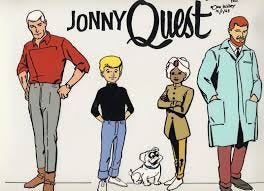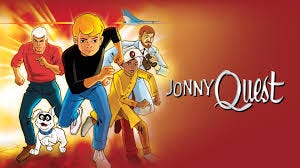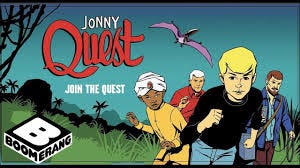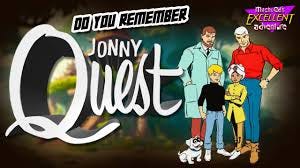This week, in a time when live-action spies ruled the waves, was a time for an animation inspiration for the younger generation.
The History
Jonny Quest, one of Hanna-Barbera's most iconic creations, debuted on the American television network ABC in 1964. Conceived by artist Doug Wildey, Jonny Quest marked a stark departure from the typical comedic animations of the era. Inspired by adventure pulp fiction, comic strips like Terry and the Pirates, and live-action spy thrillers, the series brought a more realistic, dramatic tone to animated television.
The series was groundbreaking in several technical aspects. Unlike many animated shows at the time, Jonny Quest featured complex storylines and used rotoscoping to achieve a more fluid, lifelike animation style. Rotoscoping involves tracing over live-action footage frame-by-frame, resulting in more realistic movement. With only 26 episodes produced during its original 1964-65 run, Jonny Quest made a lasting impact, introducing audiences to a rich blend of science fiction, action, and exotic locales.
Voice actors like Tim Matheson, who portrayed the young Jonny Quest, and Mike Road as Race Bannon gave distinct voices to these adventure-driven characters. Danny Bravo provided the voice for Hadji, Jonny’s Indian friend and adoptive brother, whose mystical abilities and wisdom often aided the team in their perilous missions. Jonny Quest has seen several reboots and adaptations, including The New Adventures of Jonny Quest in 1986 and The Real Adventures of Jonny Quest in 1996, which introduced CGI sequences to update the visual style.
The Characters
Jonny Quest
The titular character, Jonny, is a brave and curious young boy whose quick thinking often saves the day. He represents the spirit of youthful adventure and determination, central to the series.Dr. Benton Quest
Jonny’s father, Dr Benton Quest, is a brilliant scientist and researcher. He is often engaged in various scientific missions, and his expertise drives many of the adventures. He also serves as the series’ moral and intellectual backbone.Race Bannon
A skilled government agent assigned to protect the Quest family, Race Bannon is known for his combat prowess and resourcefulness. His tough yet warm-hearted persona makes him a favourite among fans.Hadji Singh
Hadji is an Indian boy adopted by Dr. Quest. His resourcefulness, intelligence, and occasional mystical abilities help him solve various predicaments throughout the series.Bandit
The family’s dog, Bandit, is not only Jonny’s loyal companion but also a vital part of the team, often providing comic relief or inadvertently saving the day.
The Plotlines
The plotlines of Jonny Quest often centre around international intrigue, scientific discoveries, and secret missions. Each episode plunges the Quest team into exotic settings such as tropical rainforests, remote islands, or lost cities. Villains range from international spies and rogue scientists to ancient curses and mythical beasts. Episodes like The Mystery of the Lizard Men and The Curse of Anubis demonstrate the show’s commitment to blending science fiction with horror and adventure elements, making it a multifaceted viewing experience.
Famous People
While Jonny Quest did not have direct celebrity endorsements during its original run, the series gained admiration from notable figures in the entertainment industry over the decades. Hollywood directors like Steven Spielberg and Quentin Tarantino have cited Jonny Quest as influencing their work, recognising its adventurous spirit and innovative storytelling. Tarantino even expressed interest in making a live-action adaptation of the series in the early 2000s.
Popular Culture
Jonny Quest has considerably impacted popular culture, inspiring countless other animated and live-action series. Shows like The Venture Bros. drew heavily from Jonny Quest, parodying its tropes while paying homage to its adventurous themes. The show's visual style, with its dramatic use of shadows and vivid action sequences, influenced both contemporary and later animated productions. As societal norms evolved, so did the portrayal of characters like Hadji, who were initially depicted with stereotypical mysticism. Modern reboots have attempted to move away from such depictions, emphasising his intelligence and ingenuity instead.
Advertising
The popularity of Jonny Quest naturally led to its use in advertising campaigns. In the 1960s and 1970s, the characters were featured in promotional tie-ins for breakfast cereals and other consumer products. These partnerships solidified the series’ status in the American household. More recently, characters like Race Bannon and Bandit were used in advertisements promoting nostalgia-driven products aimed at adults who grew up with the series.
Spin-Offs and Related Work
The success of Jonny Quest resulted in several spin-offs and adaptations. The New Adventures of Jonny Quest aired in 1986, reintroducing the Quest family to a new generation with updated visuals and simplified plotlines. In 1996, The Real Adventures of Jonny Quest arrived, featuring CGI sequences that were cutting-edge at the time. This adaptation explored more complex storylines and character development but faced challenges in its production, ultimately affecting its consistency and reception.
Beyond television, Jonny Quest spawned an array of merchandise, from action figures to comic books. These products helped cement the series’ place in popular culture, offering fans a tangible connection to the show’s adventurous spirit.
Financials
Despite its relatively short original run, Jonny Quest has succeeded financially through multiple syndications, reboots, and merchandise sales. The 1996 adaptation, although less economically successful than expected, expanded the brand into the CGI frontier. Revenue from merchandise, including action figures, comics, and DVDs, contributed to the franchise's lasting appeal. Precise financial statistics for the original series must be well-documented, but the rebooted series and merchandise reportedly generated millions in revenue over the decades.
Legacy
Jonny Quest left a considerable legacy in animation, paving the way for action-adventure animated series. Its combination of thrilling adventure, realistic animation, and mature storytelling was unlike anything else on television at the time. The show inspired a range of imitators and successors, creating a genre of animated storytelling that continues to influence modern creators.
Fun Facts
Doug Wildey initially wanted Jonny Quest to be titled The Adventures of Jonny Quest, but the studio decided on a more straightforward title.
The government agents reportedly inspired the character of Race Bannon in Ian Fleming’s James Bond series.
Bandit, Jonny’s dog, was added to provide comic relief and appeal to younger audiences, as well as for marketing opportunities.
Conclusion
To sum it all up, Jonny Quest was more than just an animated series; it was a trailblazer in its genre, blending realistic storytelling with science fiction and adventure. The series’ combination of rotoscoping, mature themes, and innovative plotlines set a new standard for animated television. Its impact is evident in the countless series that followed in its adventurous footsteps, and its legacy continues to echo with nostalgic fans and new audiences. From its original run to its various reboots and spin-offs, Jonny Quest has stood the test of time as a beacon of animated storytelling.
If its enduring history tells us anything, the spirit of adventure will always find a way to capture the imagination of young and old alike.
I am always looking to widen the reach of animation, so please feel free to contact me. I like hearing from animation fans and converts.








I want to Race Bannon when I grow up.
Hanna-Barbera was breaking considerable new ground for animation on television in the 1960s, and this show was a big part of that. And, as with their comedy-oriented programs, it created a template that would be returned to often in the studio's history.